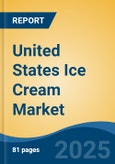Speak directly to the analyst to clarify any post sales queries you may have.
10% Free customizationThis report comes with 10% free customization, enabling you to add data that meets your specific business needs.
Health-conscious behaviors are influencing product innovation, with rising popularity of low-calorie, dairy-free, and plant-based varieties. Consumers are also seeking novel and interactive experiences, encouraging brands to explore unconventional flavor development. While major manufacturers like Unilever and Froneri continue to hold strong market positions, regional brands and private labels are gaining ground. The market benefits from a diverse distribution network, with supermarkets leading in volume and online platforms showing robust growth potential.
Key Market Drivers
Rising Demand for Premium and Artisanal Products
Consumer interest in premium and artisanal ice creams is a key driver of market expansion. Many buyers are turning to these products for their superior taste, rich texture, and cleaner ingredient profiles. Premium options often feature organic dairy, natural sweeteners, and reduced additives, appealing to consumers who balance indulgence with health awareness. Artisanal brands attract consumers through handcrafted, small-batch production and regionally inspired or exotic flavor innovations. These offerings often come with compelling brand narratives that resonate with modern lifestyle values, such as authenticity and local sourcing. Traditional brands are responding to this shift by expanding their premium portfolios to maintain competitiveness in a market increasingly defined by quality and experience.Key Market Challenges
Health Concerns and Nutritional Perception
Despite the growth of healthier ice cream alternatives, traditional ice cream products continue to face scrutiny due to their high fat, sugar, and calorie content. This health-related perception reduces the frequency of consumption, particularly among older adults and individuals with dietary restrictions. Although low-calorie and dairy-free options are gaining traction, consumers often question the inclusion of artificial sweeteners and additives in these alternatives. Clean-label expectations are increasing, creating pressure on manufacturers to deliver better-for-you products that still offer the indulgent taste and texture associated with ice cream. Balancing indulgence with nutritional improvements remains a complex challenge for the industry.Key Market Trends
Growing Popularity of Plant-Based and Dairy-Free Ice Cream
Demand for plant-based and dairy-free ice cream has seen a sharp rise, fueled by factors such as increasing veganism, lactose intolerance, and environmental awareness. Once considered niche, these products are now widely available and adopted by mainstream brands, which have introduced lines made from oat, coconut, almond, and cashew milks. Companies like Ben & Jerry’s, So Delicious, and Oatly are investing in innovation to enhance taste, texture, and nutritional quality. Sustainability concerns are also accelerating this trend, as consumers perceive plant-based offerings as environmentally responsible choices. With advancements in formulation, dairy-free ice cream now closely competes with traditional offerings in taste and appeal.Key Players Profiled in this United States Ice Cream Market Report
- Wells Enterprises, Inc.
- Pierre's Ice Cream Company, Inc.
- Blue Bell Creameries
- General Mills Inc. (Haagen-Dazs)
- Turkey Hill Dairy
- Inspire Brands, Inc.
- American Dairy Queen Corporation (Dairy Queen)
- Kahala Franchising, L.L.C. (Cold Stone Creamery)
- Mayfield Dairy Farms
- Graeter’s Ice Cream Company
Report Scope:
In this report, the United States Ice Cream Market has been segmented into the following categories, in addition to the industry trends which have also been detailed below:United States Ice Cream Market, by Product Type:
- Brick
- Tub
- Cup
- Cone
- Stick
- Others
United States Ice Cream Market, by Type:
- Dairy
- Vegan
United States Ice Cream Market, by Sales Channel:
- Supermarkets/Hypermarkets
- Specialty Stores
- Grocery Stores
- Online
- Others
United States Ice Cream Market, by Region:
- South
- West
- Midwest
- Northeast
Competitive Landscape
Company Profiles: Detailed analysis of the major companies present in the United States Ice Cream Market.Available Customizations:
With the given market data, the publisher offers customizations according to a company's specific needs. The following customization options are available for the report.Company Information
- Detailed analysis and profiling of additional market players (up to five).
This product will be delivered within 1-3 business days.
Table of Contents
Companies Mentioned
The leading companies profiled in this United States Ice Cream market report include:- Wells Enterprises, Inc.
- Pierre's Ice Cream Company, Inc.
- Blue Bell Creameries
- General Mills Inc. (Haagen-Dazs)
- Turkey Hill Dairy
- Inspire Brands, Inc.
- American Dairy Queen Corporation (Dairy Queen)
- Kahala Franchising, L.L.C. (Cold Stone Creamery)
- Mayfield Dairy Farms
- Graeter’s Ice Cream Company
Table Information
| Report Attribute | Details |
|---|---|
| No. of Pages | 81 |
| Published | May 2025 |
| Forecast Period | 2024 - 2030 |
| Estimated Market Value ( USD | $ 19.04 Billion |
| Forecasted Market Value ( USD | $ 23.43 Billion |
| Compound Annual Growth Rate | 3.5% |
| Regions Covered | United States |
| No. of Companies Mentioned | 11 |









